Family Research Council President Tony Perkins says true evangelical voters could have a tough time pulling the lever for Donald Trump in November if he is the Republican presidential nominee, even as he acknowledged the giant effect the insurgent candidate has had on the party.
Mr. Perkins also said Mr. Trump’s apparent support by evangelicals in the Republican primary may be overstated by a too-broad definition of who should be considered an evangelical.
“I am very concerned about what may happen in a general election, especially once a lot of focus is placed on Donald Trump, his past positions, his personal affairs, conduct, various things — I think that’s going to have an impact on the way evangelicals respond in the general election,” Mr. Perkins said on C-SPAN’s “Newsmakers,” which aired Sunday.
Mr. Trump has frequently touted his support among evangelical Christians in the presidential election, and Mr. Perkins said he doesn’t doubt Mr. Trump’s message does appeal to some in the crucial voting bloc.
“I think there’s a lot of fear in this election cycle — fear of a nation that has lost its way; it’s changing, it’s unrecognizable,” Mr. Perkins said. “And then frustration, which is probably the dominant feeling or emotion that’s being expressed right now — this frustration with a political class, in particular the Republican Party, that has overpromised to this constituency and underperformed routinely.
“And so I think they see this guy coming along who, quite frankly, his past holdings on issues and his conduct is antithetical to evangelical teaching, but yet, he’s struck a chord with them [in] that he’s going to throw the political class out on its head,” he said.
Mr. Perkins has personally endorsed Sen. Ted Cruz in the Republican nomination race and wouldn’t commit to endorsing Mr. Trump in the general election if the billionaire businessman is on the ballot.
Mr. Perkins also said the definition of “evangelical” has been stretched this cycle and is being used to encompass a lot of people who are “not technically evangelicals.”
“When I think you talk about evangelicals — those who go to church on a weekly basis, their faith is very important to them — in fact, it guides the decisions they make beyond the walls of the church,” he said.
“That begins to narrow, and we actually see from polling, exit surveys from Reuters and others that those who attend church on a weekly basis are not breaking for Donald Trump,” he said. “In fact, in the Southern states, 64 percent of evangelicals did not vote for Donald Trump.”
Asked whether a Donald Trump nomination would fracture the Republican Party, Mr. Perkins said: “I think the GOP’s already fractured.”
“I don’t know that it’s overt or that it’s intentional, but I do think that there might be some siding against the Republican establishment, where some people are just completely fed up and they want to see just a free-for-all within the party, and that may be why they’re supporting Donald Trump,” he said.
Mr. Perkins said he was able to get past some of Republican presidential nominee Mitt Romney’s inconsistencies and support him in the 2012 general election, but that many evangelical Christians could not and stayed home as a result.
“I think that becomes a real problem for Donald Trump if he is the nominee in a general election, because I have no doubt that if he were to get the nomination that we would hear several months’ worth of explaining of his past positions, of his casinos, strip clubs, all these other things that would be used to really suppress evangelical turnout in the general election, so I think it’s a huge problem for the Republicans,” Mr. Perkins said.
Mr. Trump has used former President Ronald Reagan’s political evolution to explain his own shifts on issues like abortion, for example.
Asked in a recent interview how evangelicals can trust him, Mr. Trump cited support from leaders like Jerry Falwell Jr., the president of Liberty University.
“They know my views. … They also know about me,” Mr. Trump told the Christian Broadcasting Network. “They know I’m going to be great on security, I’m going to be great with the military, I’m going to be great with ISIS. You know, they have that view, too. That’s a very important thing. They want leadership.”
• David Sherfinski can be reached at dsherfinski@washingtontimes.com.




Please read our comment policy before commenting.